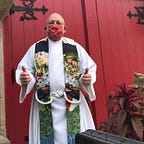Becoming an Adult @ 63
I’ve thought of myself as a fairly smart guy. I struggled in my undergraduate studies — like many guys in their late teens and early 20s. I began as a music education major. That lasted till the first semester of my sophomore year. I truly was sophomoric, immature, pretentious, and very frightened. Plus, it was the late 70s. I was a closeted gay white guy who didn’t have a whole lot of friends and was very confused about how to accept my adult responsibilities. I moved away from home — then went back — changed my major — did all that shit and graduated with a BA in Radio-TV Broadcast Management. I figured I’d become a superb sports announcer — uh, no.
I’ll share more of my life story as I draft more posts. For now, let’s just say that I didn’t really realize how emotionally immature I was till about three years ago. One bit of personal advice — don’t confuse knowledge with wisdom. And another — as Sophocles is credited with saying (in Greek) “The only true wisdom is knowing that you know nothing.” We learn life tacitly, despite the billions of dollars invested and amortized in student loans.
Like many of us -regardless of where we land on the geo-political-spiritual spectrum, the way I live and perceive the world is radically changing over the past five year — especially since February of 2020. I found myself in emotional tatters on a more than regular basis. I was (still am occasionally) numbing out my idealistic tendencies and expectations. Why don’t people care more about the planet we live on? Why do people in one tribe despise or hate people in another tribe (white/black, urban/rural, wealthy/poor). Isabel Wilkerson’s “caste” work is so intensely profound in understanding how we anthropologically create artificial systems of difference to allocate power, resources, and basic natural decencies. So, I check out by drinking too much wine, arguing irrationally with someone I don’t like as a means to vent my stress or some other totally illogical activity triggered by some situation frequently beyond my ability to influence it.
Like you, my amygdala has been around for centuries more than my frontal cortex; so my fight/flight/freeze skills are much more reactive than my contemplative, mindful, and reason responsibilities. (Thank you Jonathan Haidt). I’ve known about the Serenity Prayer since I was a physical teenager and it wasn’t until I admitted that I was powerless (not helpless) over the dysfunctions of my biological and genetic composition that I sought out resources such as Cognitive Behavioral Therapy, Contemplation, and committed myself to becoming healthier while living wholeheartedly.
I am still foolish: thus, I’m recovering through the12 Steps of realizing I am an Adult Child. I grew up in a dysfunctional family system. I carry centuries of abandonment, trauma, and addictions (epi)genetically. My ancestors also were survivors, pioneers, and rigorous people of faith. Thus my pilgrimage is an adventure of coming to terms with understanding and believing in accepting things I cannot change, striving to change — dare I say transform the things which I should, and gaining wisdom (comprehending and building upon tacit knowledge) to contemplate and act upon the differences. This work begins, continues, and ends in and with me while learning that the world is not as I perceive it and hardship is indeed a primary pathway to peace, grace, and resurrection (new life).
Blessings along The Way, JSS+
